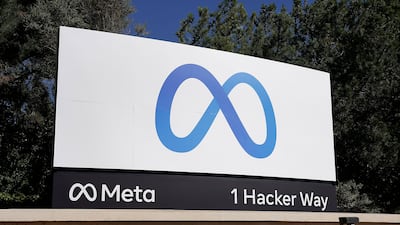Facebook parent company Meta Platforms has built an artificial intelligence system that rivals the likes of ChatGPT and Google's Bard, but it is taking a different approach: releasing it for free.
Meta chief executive Mark Zuckerberg said on Tuesday that the company was joining forces with Microsoft to introduce the next generation of its AI large language model and making the technology, known as Llama 2, free for research and commercial use.
Much like tech peers Google and Microsoft, the social media company has long had a big research team of computer scientists devoted to advancing AI technology.
But it has been overshadowed as the release of ChatGPT sparked a rush to profit off of “generative AI” tools that can create new prose, images and other media.
Meta has also tried to distinguish itself by being more open than some of its Big Tech rivals about offering a peek at the data and code it uses to build AI systems.
It has argued that such openness makes it easier for outside researchers to help identify and mitigate the bias and toxicity that AI systems pick up by ingesting how real people write and communicate.
“Open source drives innovation because it enables many more developers to build with new technology,” Mr Zuckerberg said in a Facebook post on Tuesday.
“It also improves safety and security because when software is open, more people can scrutinise it to identify and fix potential issues. I believe it would unlock more progress if the ecosystem were more open, which is why we’re open sourcing Llama 2.”
Mr Zuckerberg pointed to Meta's history of open-sourcing its AI work, such as with its development of the widely used machine-learning framework PyTorch.
But the research paper introducing the new model reflects less openness than Meta has shown previously in its work to build models that require ingesting large troves of digitised writings such as books, news articles and social media feeds.
It says the latest model was trained on “a new mix of data from publicly available sources, which does not include data from Meta’s products or services”, but does not specify what data was used.
It does say that Meta removed data from websites known to contain a “high volume of personal information about private individuals”.
Mr Zuckerberg said people can download the new AI models directly or through a partnership that makes them available on Microsoft's cloud platform Azure “along with Microsoft’s safety and content tools”.
The financial terms of that partnership were not disclosed.
While Microsoft is described by Meta as a “preferred” partner, Meta said the models will also be available through Amazon Web Services, which is Microsoft's main cloud rival, as well as AI start-up Hugging Face and others.
Microsoft is also a major funder and partner of OpenAI, the maker of ChatGPT.
Neither ChatGPT nor similar offerings from Microsoft or Google are open source.
Microsoft and Meta also revealed the new AI partnership at Microsoft’s annual event for business customers on Tuesday.
Microsoft said in a separate statement that the two companies “share a commitment to democratising AI and its benefits and we are excited that Meta is taking an open approach”.

